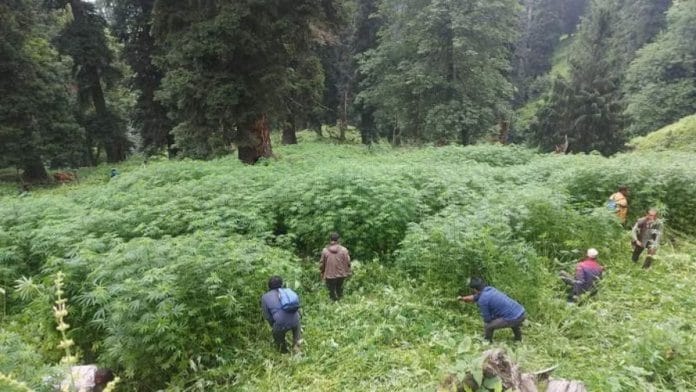Shimla: In a landmark decision, the Himachal Pradesh cabinet has approved a pilot study to explore cannabis cultivation for medicinal and industrial purposes. The project will be spearheaded by Chaudhary Sarwan Kumar Himachal Pradesh Krishi Vishvavidyalaya, Palampur, and Dr. Yashwant Singh Parmar University of Horticulture and Forestry, Nauni, with the agriculture department acting as the nodal agency.
A Himachal Pradesh minister, who wished not to be named, told ThePrint that according to the cabinet’s approval, agriculture and horticulture universities will carry out cannabis cultivation on a pilot basis before allowing the public to engage in it. “This is an in-principle approval to the concept.”
The universities have been tasked with submitting a detailed report within six months, focusing on identifying suitable cannabis varieties and outlining best cultivation practices. The report will also assess the plant’s potential applications in medicinal and industrial sectors, laying the groundwork for the state’s larger vision of legalising cannabis cultivation for non-intoxicating uses.
Also Read: In ‘Udta Kullu’, villagers destroy 15 hectares of cannabis plants ‘on deity’s command’
Legalisation push
This initiative is part of Himachal Pradesh’s broader efforts to regulate cannabis cultivation. In October 2024, the state government launched a pilot project to examine cultivation methods for cannabis on lands owned by its agricultural and forestry universities. The emphasis was on understanding the plant’s medicinal properties and the feasibility of its cultivation in the region.
The push towards legalisation gained momentum, when the Himachal Pradesh Assembly, on 6 September, 2024, accepted a report recommending controlled cannabis cultivation for scientific, medicinal and industrial purposes.
The report, tabled by revenue minister Jagat Singh Negi, excluded cultivation for narcotic uses, such as charas, and suggested amending the Himachal Pradesh Narcotics Drugs & Psychotropic Substances Rules to regulate the cannabis sector.
Speaking to ThePrint, Negi highlighted cannabis’s resilience as a crop. “The plant requires minimal water, is resistant to animal damage, and is largely disease-free. It holds immense potential for industrial and medicinal use.”
He added that industrial hemp, with negligible tetrahydrocannabinol (THC) levels, would be cultivated openly, while medicinal varieties would be strictly monitored under the Narcotic Drugs and Psychotropic Substances Act, 1985.
Economic potential & standard operating procedures
Chief Minister Sukhvinder Singh Sukhu underscored the economic benefits of legalised cannabis cultivation, estimating annual revenue generation of up to Rs 2,000 crore. Investors have already shown interest, particularly in industrial hemp, which has applications in textiles, bio-composites and sustainable construction materials.
The cabinet-approved pilot project will focus on developing SOPs for cultivation and product manufacturing. Additionally, seed banks will be established in collaboration with universities and research experts to ensure the availability of high-quality cannabis seeds with less than 0.3 percent THC for industrial use.
Himachal Pradesh’s cannabis initiative draws inspiration from states and Union territories, like Uttarakhand, Madhya Pradesh, and Jammu and Kashmir, where controlled cultivation is already permitted. A committee formed in April 2023 to study cannabis legalisation visited these regions and consulted gram panchayats across Himachal Pradesh for public feedback.
The committee’s recommendations include amending state NDPS rules to permit and regulate cannabis cultivation for non-narcotic purposes, establishing a single-window authority for decision-making and regulatory oversight, developing detailed protocols for cultivation, transport, processing, and the establishment of industrial and pharmaceutical units.
Controlled & scientific approach
To prevent misuse, the cultivation of medicinal cannabis will be conducted under strict surveillance in controlled environments. The state also plans to leverage its geographic advantage as cannabis thrives in Himachal Pradesh’s mountainous terrain.
The universities involved in the pilot study aim to balance economic opportunities with environmental and social responsibilities. If successful, the initiative could place Himachal Pradesh at the forefront of India’s efforts to harness cannabis’s potential for medicinal and industrial innovation.
The findings from this pilot study are expected to guide future policy decisions, setting the stage for a new era of sustainable economic development in the hill state.
(Edited by Radifah Kabir)






